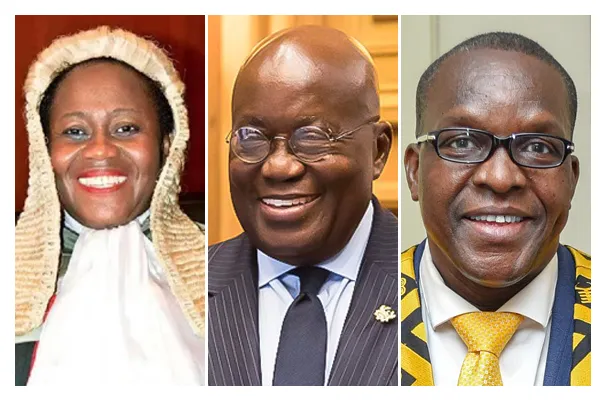In a growing debate surrounding recent parliamentary events in Ghana, Christopher Yaw Nyinevi, Lecturer at the Department of Public Law, Kwame Nkrumah University of Science and Technology (KNUST), has provided a thought-provoking clarification on the exclusive jurisdiction of the Supreme Court to interpret the Constitution.
In his remarks, Nyinevi rejected the notion that the Speaker of Parliament usurped the Supreme Court’s jurisdiction and further denounced the argument that the Speaker should have referred the issue to the Supreme Court or awaited a ruling on a pre-existing case filed with the Court on the same matter.
Nyinevi contended that this interpretation is flawed, underscoring that the Constitution empowers three co-equal branches of government—the Executive, Legislature, and Judiciary—each with distinct and autonomous mandates.
“The Constitution creates three co-equal branches of government, with each assigned specific functions under the Constitution. In performing their functions, they’re each supposed to apply the provisions of the Constitution that are relevant to their mandates.
“This necessarily involves having to decide what, in their opinion, the particular provisions mean and what they require of them in every instance of executing their mandate. It follows that, in performing their day-to-day functions, the political branches have to interpret the Constitution”.
Christopher Yaw Nyinevi, Lecturer, Department of Public Law, KNUST
He went on to explain that even within the judiciary, the Chief Justice and other officers apply constitutional provisions in administrative functions.
Nyinevi cautioned against treating the Supreme Court as a “constitutional oracle” that must be consulted every time constitutional questions arise.
Instead, the Court’s role, he argued is to adjudicate disputes that are brought before it through proper legal channels, not to serve as a preemptive advisory body for other branches of government.
Understanding the Supreme Court’s “Exclusive Jurisdiction“
Nyinevi, who specializes in Public International Law, African Union Law and Legal Writing further offered a nuanced explanation of the Supreme Court’s “exclusive jurisdiction” under Article 130 of the Constitution, which grants the Court the sole authority to decide constitutional questions within the judicial structure.
He pointed out that the above provision, however, pertains to the relationship between the Supreme Court and lower courts, not between the judiciary and the other branches of government.
According to Nyinevi, Article 130 establishes that only the Supreme Court can originate and determine constitutional disputes within the judicial system, ensuring that lower courts must refer such questions to the Supreme Court for resolution.
“This is why Article 130(2) reinforces the point that whenever a constitutional issue arises in ‘any proceedings in a court other than the Supreme Court, that court shall stay the proceedings and refer the question of law involved to the Supreme Court for determination; and the court in which the question arose shall dispose of the case in accordance with the decision of the Supreme Court’.
“Article 130(2) is directed at courts lower than the Supreme Court within the judicial system, not the political branches or their agencies. Therefore, there is no requirement for Parliament, the Executive, or any of their agencies to refer constitutional questions to the Supreme Court for interpretation before making decisions they must take”.
Christopher Yaw Nyinevi, Lecturer, Department of Public Law, KNUST

Distinguishing Constitutional Disputes from Day-to-Day Governance
Moreover, each of the branches of government in the legal view of Nyinevi can form their view of what provisions of the Constitution relevant to their functions mean and go ahead to make decisions based on it.
“If someone disagrees, they’re of course entitled to challenge it judicially”, he stated, adding that it is only then that the exclusive original jurisdiction of the Supreme Court kicks in relative to other courts within the judicial system.
He stressed that the decision of the Supreme Court on what the particular provision of the Constitution means therefore becomes the authoritative and binding legal position which every person or authority must comply with.
Importantly, Christopher Yaw Nyinevi posited that the mere fact that a co-equal branch of government takes a position on a constitutional provision does not amount to an infringement on the Supreme Court’s jurisdiction.
Such actions, he opined are part of the normal execution of constitutional mandates by the Executive or Legislature, and should not be seen as overstepping judicial authority.
The Way Forward: Balancing Branches of Government
In conclusion, Christopher Yaw Nyinevi called for a more informed understanding of the Supreme Court’s role in Ghana’s constitutional democracy.
He contended that while the Court’s authority to interpret the Constitution is paramount within the judicial system, it does not extend to serving as a de facto advisory body for other branches of government.
According to him, the Constitution envisions a balanced relationship among the three branches of government, each empowered to apply constitutional provisions independently within their spheres of authority.
His remarks provide a critical lens through which to view recent parliamentary actions and clarify misconceptions surrounding the Supreme Court’s role.
He stressed that constitutional governance requires all branches of government to navigate constitutional interpretation responsibly, but it does not require them to defer to the Supreme Court in every instance.
Instead, it is only when constitutional disputes arise through proper legal challenges that the Court’s exclusive jurisdiction is invoked.




















